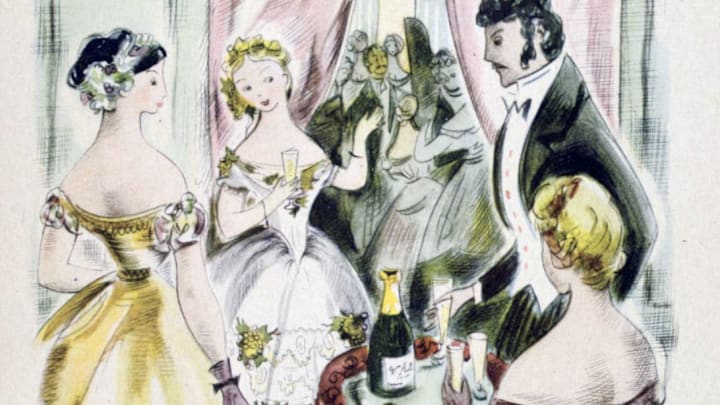After you’ve gotten dressed up like a lighthouse (and before you roll in someone’s ivory), spice things up at your New Year’s Eve shindig with these delightful old-timey slang terms, courtesy of Green’s Dictionary of Slang.
- Barney
- Dressed Up Like a Lighthouse
- Muffin-worry
- Blow Off
- Bugged Up
- Spreeing Cove
- Jazzer
- Conversation Water, Joy Water, Swell’s Lush, Sassy Suds, and Wealthy Water
- Champagne Charlie
- Laughing Soup and Laughing Soup Parlor
- In One’s Airs
- Catch a Fox
- Roll in Someone’s Ivory
Barney
According to Green’s, this slang term—which has Irish origins—is defined as “an enjoyable social occasion; a rowdy party,” and dates to 1859. It fell out of popular usage in the 1960s.
Dressed Up Like a Lighthouse
This phrase is used to describe someone “flashily, ostentatiously dressed,” and dates to 1933.
Muffin-worry
This term for an evening party dates to 1855. Just a few years later, it would come to mean “an old ladies’ tea party.”
Blow Off
This term has two potential meanings that could apply to New Year’s Eve: The first, which you’ll hopefully avoid, is “an emotional outburst; a sudden fight or argument,” and was used between 1863 and 1952. The second, from 1886 and in use until 1915, is “a party, a celebration.” Here’s an example usage, from the book Knocking the Neighbors: “The Blow-Off came on the Trip to the City. That was the Big Entertainment.”
Bugged Up
Another way to describe getting dressed up, this slang term dates back to 1893, and fell out of use in the 1930s.
Spreeing Cove
You’ve probably heard the word spree used in reference to partying, but you’ve probably never heard of a spreeing cove, or “one who is enjoying a party or jollification,” a term that dates to 1846.
Jazzer
Jazzer is term for a party-goer and dates to 1922.
Conversation Water, Joy Water, Swell’s Lush, Sassy Suds, and Wealthy Water
These are all slang terms for champagne: Conversation water dates to 1880. In the U.S., joy water meant “alcohol,” generally, between 1903 and 1945, but in Australia, it specifically referred to champagne and was in use from 1919 to 1924. Swell’s lush is another Aussie slang term for champagne, in use in 1876.
Sassy suds and wealthy water date to 1907; Walla Walla, Washington’s Evening Statesman provides an example of their usage: “When we entertain fittingly we ...‘Lick up the wealthy water,’ or the ‘Sassy suds.’ ”
Champagne Charlie
This term, which means “a devotee of champagne,” dates to 1867, when H.J. Whymark and Alfred Lee released the popular song “Champagne Charlie Is My Name.” Here’s a sampling of the lyrics:
“I’ve seen a deal of gaiety throughout my noisy life
With all my grand accomplishments I ne’er could get a wife,
The thing I most excel in is the P. R. F. G. game,
A noise all night in bed all day, and swimming in Champagne.
For Champagne Charlie is my name, Champagne Charlie is my name
Good for any game at night, my boys, good for any game at night, my boys,
Champagne Charlie is my name, Champagne Charlie is my name
Good for any game at night, boys, who’ll come and join me in a spree.”
According to Green’s, “The original Champagne Charlie was a wine-merchant who was very free with gifts of his stock.”
Laughing Soup and Laughing Soup Parlor
Laughing soup is another slang term for champagne, dating to 1903; a laughing soup parlor is a bar.
In One’s Airs
A person could end up in one’s airs—a.k.a. drunk—after drinking all of that champagne. None other than Ben Franklin defined the term in The Pennsylvania Gazette: “They come to be well understood to signify plainly that A MAN IS DRUNK. [...] He’s in his Airs.”
Catch a Fox
Slang term for being very drunk, in use from 1630 to the 1720s.
Roll in Someone’s Ivory
You might be doing this at midnight on New Year's Eve: To roll in someone’s ivory, which dates to 1780, means “to kiss.”
Discover More Vintage Slang:
A version of this story ran in 2020; it has been updated for 2024.
